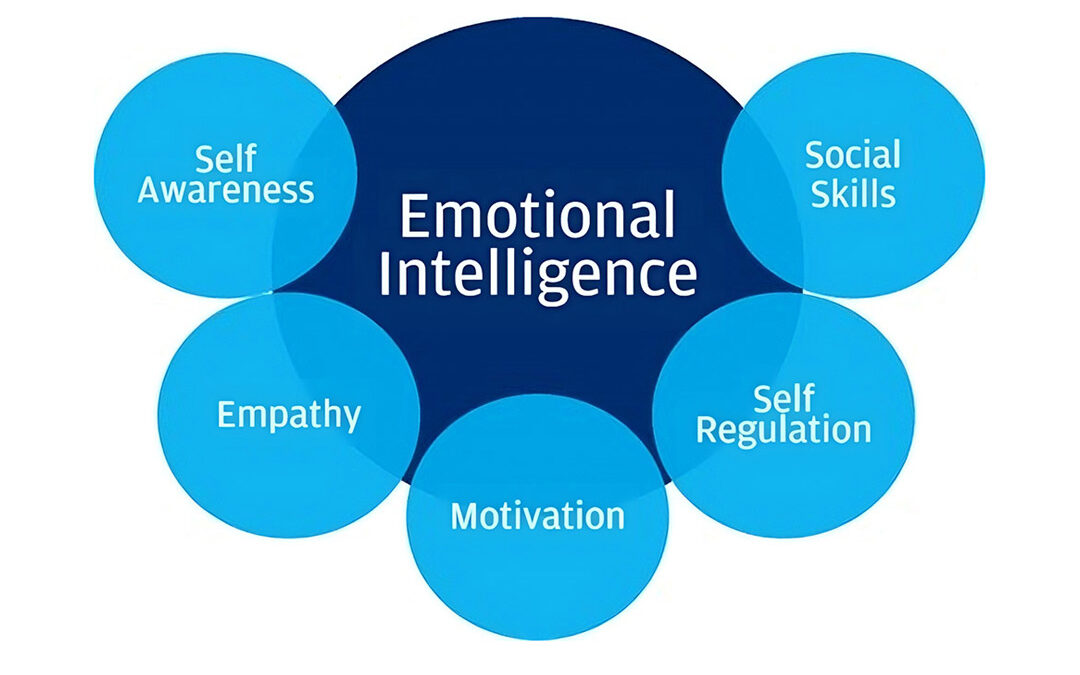Incorporating Emotional Intelligence into a company or organization can enhance customer satisfaction, team dynamics, and overall business success.
Emotional Intelligence (EI) refers to the ability to recognize, understand, and manage both your own emotions and those of others. It involves being aware of your emotions, having the ability to control them, and effectively using emotional information to guide thinking and behavior.
In the fast-paced world of entrepreneurship and business ownership, technical skills and industry knowledge often take the spotlight. However, one often overlooked but crucial aspect of success is Emotional Intelligence. As a business owner, mastering EI can be the key to navigating challenges, building strong relationships, and achieving sustainable growth.
Let’s delve into how cultivating emotional intelligence can empower business owners to thrive in today’s competitive landscape.
Understanding Emotional Intelligence
Before we can discuss EI, we need to understand what it is… At its core, EI encompasses self-awareness, self-regulation, social awareness, and relationship management. It’s about recognizing and understanding your own emotions, managing them effectively, empathizing with others, and building meaningful connections. In the context of business, EI goes beyond mere technical skills; it’s about how you lead, communicate, and interact with your team at every level.
Building Meaningful Relationships
Strong relationships are the foundation of business success. Whether it’s with clients, suppliers, or partners, effective relationship management is essential for fostering loyalty, collaboration, and mutual success. EI enables business owners to connect authentically with others, build rapport, and navigate interpersonal dynamics with empathy and sensitivity.
In the book on Emotional Intelligence, Daniel Goleman writes, “If your emotional abilities aren’t in hand, if you don’t have self-awareness, if you are not able to manage your distressing emotions, if you can’t have empathy and have effective relationships, then no matter how smart you are, you are not going to get very far”.
By prioritizing relationships based on trust, integrity, and mutual benefit, you can cultivate a network of allies who support your business goals.
Leading with Authenticity
Effective leadership begins with self-awareness. As a business owner, understanding your strengths, weaknesses, values, and triggers is essential for leading authentically.
By acknowledging your emotions and how they influence your decisions and interactions, you can lead with greater clarity, confidence, and integrity.
Self-regulation allows you to maintain composure under pressure, make rational decisions, and adapt to changing circumstances without being swayed by impulsive reactions.
Being authentic as a leader starts with being genuine, transparent, and true to yourself while inspiring and guiding others. Below are some tips on how you can lead with authenticity:
- Know yourself: Understand your values, strengths, weaknesses, and beliefs. Self-awareness is key to authentic leadership
- Be transparent: Communicate openly with your team. Share information, thoughts, and decisions openly, even when they are difficult.
- Build trust: Act with integrity and consistency. Honor commitments, admit mistakes, and be reliable.
- Listen actively: Value the perspectives and ideas of others. Encourage open dialogue and truly listen to what your team members have to say.
- Be empathetic: Understand the feelings and experiences of those around you. Show empathy and compassion and strive to create a supportive environment.
- Lead by example: Understand the behaviors and values you want to see in others. Your actions speak louder than words.
- Encourage authenticity in others: Create a culture where people feel comfortable being themselves.
- Continuously learn and grow: Stay curious and humble. Seek feedback, reflect, reflect on your experiences, and strive to improve as a leader and as a person.
By embodying these principles, you can lead authentically and inspire others to do the same.
Fostering a Positive Work Culture
Business success is not just about profitability; it’s also about creating a thriving work environment where employees feel valued, motivated, and engaged. Social awareness enables business owners to empathize with their team members, understand their perspectives, and address their needs effectively.
In his book The Culture Code, Daniel Coyle discusses connecting with your team members… “Belonging cues are behaviors that create safe connection in groups. They include, among others, proximity, eye contact, energy, mimicry, turn taking, attention, body language, vocal pitch, consistency of emphasis, and whether everyone talks to everyone else in the group”.
By fostering open communication, active listening, and a culture of trust and respect, you can cultivate a positive work culture that fuels productivity, innovation, and employee retention.
It’s important to understand, culture encompasses more than mere festivities or acknowledging employee birthdays. It’s about aligning a team’s focus and fostering seamless collaboration toward shared objectives, consistently, day in and day out.
Navigating Challenges with Resilience
In the unpredictable world of business, challenges and setbacks are inevitable. However, it’s how you respond to these challenges that determines your success. Emotional Intelligence equips business owners with the resilience and adaptability to bounce back from adversity stronger than before. By maintaining a positive outlook, seeking constructive solutions, and rallying your team around a shared vision, you can turn obstacles into opportunities for growth and innovation.
Below are eight (8) ways you can leverage Emotional Intelligence at work and in your personal life:
- Self-awareness: Understand your own emotions, strengths, and weaknesses. Recognize how your emotions affect your behavior and interactions with others.
- Empathy: Put yourself in ‘others’ shoes and strive to understand their perspectives, feelings, and needs.
- Active listening is key here. Pay attention to verbal and nonverbal cues and validate others’ emotions without judgement. By demonstrating empathy, you build trust, and rapport with others.
- Emotional regulation: Manage your emotions effectively, especially in challenging or stressful situations. Stay calm and composed, even when faced with conflict or disagreement. By regulating your emotions, you create a safe and supportive environment for open communication and collaboration.
- Effective communication: Communicate openly, honestly, and respectfully with others. Tailor your communication style to suit the preferences and needs of the person you’re interacting with. Be mindful of your tone, body language, and choice of words to convey your message clearly and empathetically.
- Conflict resolution: Approach conflicts constructively, seeking mutually beneficial solutions while maintaining relationships. Focus on understanding the underlying issues and finding common ground. Practice active listening, validate others’ perspectives, and express your own thoughts and feelings assertively yet respectfully.
- Building trust: Trust is the foundation of any strong relationship.
Be reliable, honest, and consistent in your words and actions. Follow through on your commitments and demonstrate integrity in all your interactions. Trust takes time to build but is essential for fostering deeper connections.
- Adaptability: Be flexible and adaptable in your interactions with others. Recognize and respect differences in personalities, communication styles, and cultural backgrounds. Adjust your approach as needed to accommodate the preferences and needs of the people you’re engaging with.
- Recognizing boundaries: Respect others’ boundaries and personal space. Pay attention to cues indicating discomfort or disinterest and adjust your behavior accordingly. Building relationships involves striking a balance between being supportive and respectful of others’ autonomy.
In summary, by applying these principles of Emotional Intelligence, you can cultivate meaningful and fulfilling relationships rooted in trust, empathy, and mutual respect. Whether in the workplace, social settings, or personal relationships, EI serves as a powerful tool for building connections that enrich your life and the lives of those around you.
As we wrap up our discussion on the importance of emotional intelligence in fostering a positive work culture, it’s clear that cultivating EI is essential for creating an environment where employees feel valued, supported, and motivated to thrive.
Stay tuned for our next installment, where we’ll continue the conversation and further explore the topic of “Leadership and Culture” offering invaluable insights and actionable tips to empower yourself and your team on the journey to business success.
About the author… Steve is a dedicated family man and community member. A native of Long Island, he now resides in Charlotte, North Carolina, with his wife Veronica, and their five children. When not driving business success, he enjoys fishing, golfing, or chauffeuring his children from one activity to another, cheering them on while making connections and fostering relationships.


